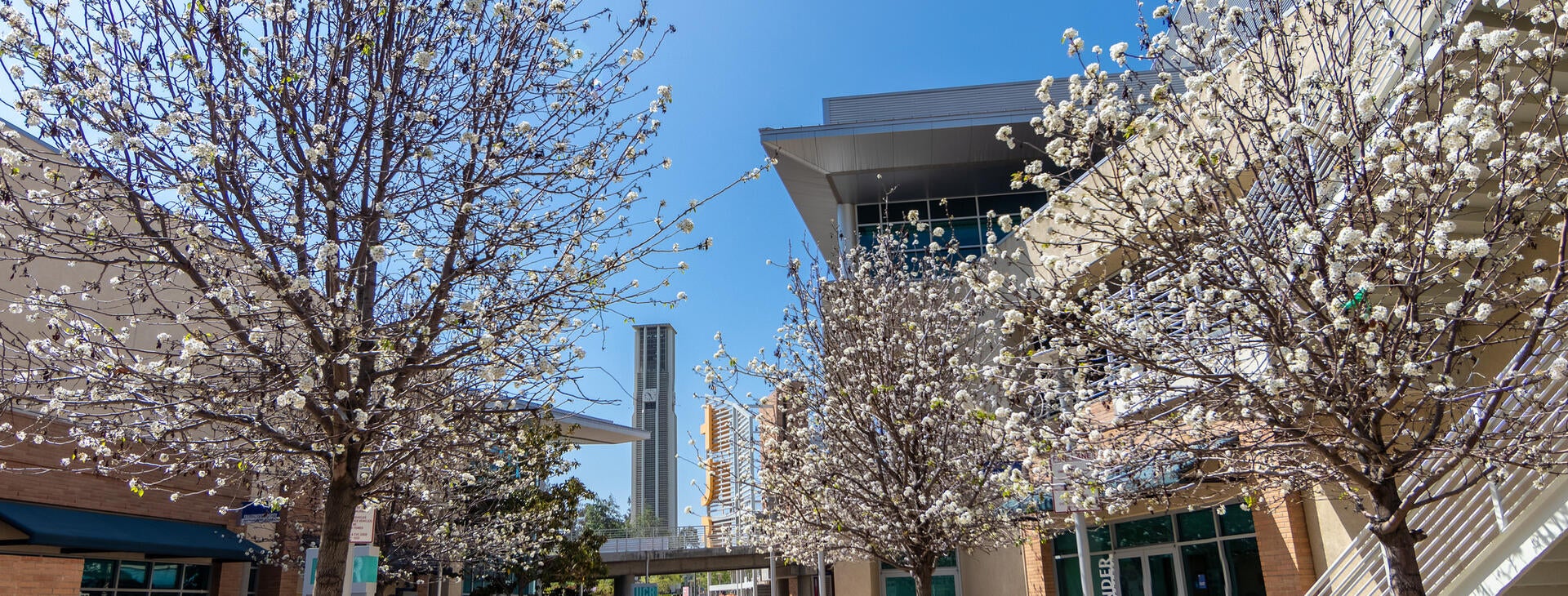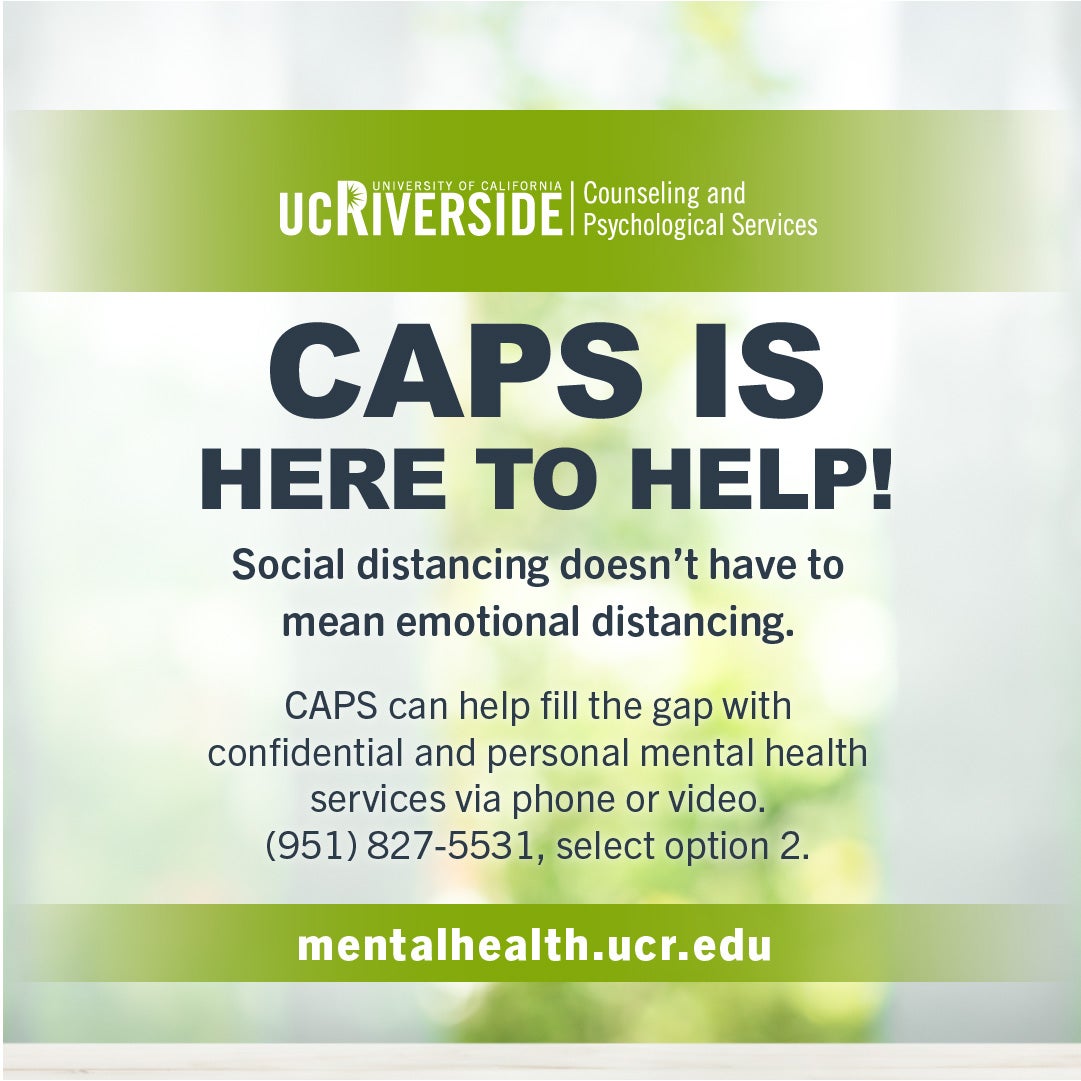For Faculty and Staff
From time to time, you may have a student about whom you are concerned. You are welcomed to consult with a case manager about any student of concern by calling (951) 827-5000 or emailing casemanager@ucr.edu. We reserve the hours of 2–4 p.m. every weekday for staff and faculty consultations.
Use this chart to determine who to contact if a student is in distress. For more resources, consult the Red Folder or refer to the frequently asked questions listed below.
Additionally, students occasionally have medical emergencies, hospitalizations and other unexpected, serious events. Case managers notify a student’s professors of their absence as a courtesy to the student. For privacy reasons, we may not be able to disclose details, but we always encourage the student to discuss their situation with their professors when they return to class.
Case Management Faculty & Staff Support
Learn more about how case managers work with faculty and staff to assist UCR students in distress with these frequently asked questions.
-
How do I refer to Case Management?
Referral: You can refer a student to Case Management by giving them our contact information.
Outreach: Faculty, staff and parents can request a case manager reach out directly to a student. Let us know your concerns about the student, and whether or not we can mention your name in the outreach.
Consultation: Faculty and staff may consult with a case manager about any student of concern by calling (951) 827-5000 or emailing casemanager@ucr.edu. We reserve the hours of 2–4 p.m. every weekday for staff and faculty consultations.
-
What is the difference between Case Management and Counseling and Psychological Services (CAPS)?
Case Management provides problem solving support, resources and advocacy for external challenges that are impacting a student’s personal and/or academic success. A case managers’ role is similar to a social worker.
CAPS provides therapeutic support for good mental health, emotional resilience and wellness. They provide individual, group and couples psychotherapy.
-
How do I know if the issue is appropriate for Case Management?
Follow this response protocol to determine who to contact if a student is in distress.
If you are concerned about a student’s well-being, then any issue is appropriate for case managers, except for Title IX concerns. We will help the student get to the right place if we are not the correct department to assist them.
If the student is having a mental health issue and is unsure about going to Counseling and Psychological Services (CAPS) we can address the student’s concerns and normalize the counseling process, as well as help the student connect with counseling support.
Case Management is not the appropriate resource for issues of sexual assault or sexual misconduct because we are not a confidential resource and will have to report information to the Title IX Office. UCR’s Campus Advocacy, Resources & Education (CARE) advocates provide specialized, confidential sexual assault and sexual misconduct support to students.
-
Are Case Managers confidential?
Case managers are covered by Family Educational Rights and Privacy Act of 1974 (FERPA) restrictions, therefore their conversations with students are private but not confidential. Case managers only share information on a need-to-know basis. This allows case managers to speak with a student’s academic advisor, financial aid counselor or other university official on the student’s behalf.
However, under FERPA, case managers cannot share any student information with anyone who is not a university employee, including parents, without the student’s written permission. The Office of the Registrar provides thisdeeper explanation of FERPA.
-
Are there walk-in appointments?
No, we do not have walk-in hours for students. Students are assisted by appointment only. Appointments can usually be made for the next day or within a few days of calling.
Faculty and staff can call at any time and speak with a case manager, if one is available. We also have a case manager available for faculty and staff consultations every weekday between 2–4 p.m.
-
How do I help a student who is suicidal?
If there is an immediate concern, call 911 or UCPD at (951) 827-5222.
If not of immediate concern, walk the student to CAPS and have them meet with the counselor on duty. If you are concerned about a student after hours, please call our 24/7 counseling line at (951) 827-8522 (UCR-TALKS) The 24/7 number connects you to a mental health therapist with whom you can consult, or who can speak directly to the student.
The Dean of Students provides additional resources and information on helping a suicidal student.
-
How should I respond to a student who is showing signs of distress?
When you are concerned about a distressed student, start with The Red Folder. It shows you the best ways to respond and help. Use The Red Folder to see:
• The UCR response protocol for helping a distressed student.
• How to recognize signs of distress.
• Contact information for the Critical Student Incident Team.
• A quick guide of essential UCR and community mental health resources.The Red Folder was created in collaboration with UCOP and the California Mental Health Services Authority (CalMHSA), and is a result of Prop 63 (Mental Health Services Act).
-
What should I do if a student's behavior is disruptive to the class?
Student Conduct and Academic Integrity Programs (SCAIP) offers these resources for working with students of concern.
-
How can I get training to help my students?
Increase your knowledge and awareness of mental health and suicide, learn how to talk with a student who may be in distress and learn how to connect them with mental health resources by completing the At-Risk online simulation. Visit go.ucr.edu/mentalhealthtraining for information on this and other online and in-person trainings you can complete to learn how to help students in crisis.
On-Campus Resources
-
Counseling and Psychological Services (CAPS)
Counseling and Psychological Services (CAPS)
Veitch Student Center, North Wing
(951) 827-5531
24/7 Crisis Counselor: (951) 827-8255 (UCR-TALK) or 2-8255 (2-TALK) from campus phones
Website: counseling.ucr.edu
CAPS professionals provide a range of programs for students to promote mental health, emotional resilience and wellness throughout the campus community. Clinical services include individual counseling, couples counseling, and group therapy, as well as psychiatric services. All services are free, confidential and provided by a diverse and multiculturally competent professional staff.
-
Promoting Student Mental Health: A Guide for UC Faculty and Staff
Promoting Student Mental Health: A Guide for UC Faculty and Staff
counseling.ucr.edu
This guide from the University of California covers topics including recognizing students in distress, knowing when and how to take action, and responding to students in distress.
-
Critical Student Incident Team
Critical Student Incident Team
(951) 827-5000
After-Hours Consultations: (951) 827-8522
deanofstudents.ucr.edu
The Critical Student Incident Team was created to work with the students, staff and faculty of the UCR community who are concerned about students who may be a threat to themselves or others. The team provides action and support to address the needs of students who are distressed while assuring a safe and secure campus for the entire UCR community.
-
Faculty and Staff Assistance Program (FSAP)
Faculty and Staff Assistance Program (FSAP)
Website: hr.ucr.edu
The Faculty & Staff Assistance Program (FSAP) is designed to offer confidential counseling, referral and other needed services to staff, faculty, and their family members with personal concerns, including credit or financial concerns, alcohol and drug abuse, domestic violence, and family problems.
-
UC Police Department
UC Police Department
3500 Canyon Crest Dr.
(951) 827-5222
Email: ucpdgeneralmail@ucr.edu (not monitored 24 hours a day)
Website: police.ucr.edu
Off-Campus Resources
-
CA Youth Crisis Line
CA Youth Crisis Line
(800) 843-5200
Website: calyouth.org/ca-youth-crisis-line
Facebook: https:CalYouthCrisisLineThe California Youth Crisis Line (CYCL) operates 24 hours a day, seven days a week as the statewide emergency response system for youth (ages 12–24) and families in crisis. For assistance from a trained staff or volunteer counselor, call or text the line’s 800-number or visit its website to chat.
-
National Suicide Prevention Lifeline
National Suicide Prevention Lifeline
(800) 273-8255
Website: suicidepreventionlifeline.org
The National Suicide Prevention Lifeline provides free, confidential support for people in distress, as well as prevention and crisis resources for people in distress and their loved ones. The Lifeline offers assistance by phone or web chat. -
Riverside Area Rape Crisis Center (RARCC)
Riverside Area Rape Crisis Center (RARCC)
1845 Chicago Ave., Suite A
Riverside, CA 92507
(866) 686-7273
Website: rarcc.org
The Riverside Area Rape Crisis Center (RARCC) offers support and confidential services free of charge to sexual assault survivors of all ages and their families. Services include, but are not limited to, a 24-hour crisis hotline, hospital advocacy, court accompaniment, accompaniment to law enforcement interviews, in-person crisis counseling, individual therapy, support groups, and self-defense for women and children. -
Riverside County Coalition for Alternatives to Domestic Violence
Riverside County Coalition for Alternatives to Domestic Violence (ADV)
P.O. Box 910
Riverside, CA 92502
(800) 339-7233
Email: info@alternativestodv.org
Website: alternativestodv.org
Alternatives to Domestic Violence (ADV) is a private, nonprofit organization serving all of western Riverside County with a range of services aimed at breaking the cycle of physical and emotional violence within families and the wider community. Services include a 24-hour crisis line, emergency and transitional housing, outreach services to victims of domestic violence, individual and group counseling, life skills and job training, child development services, child and teen counseling, and a range of training programs for legal professionals, first responders and employers in the identification of and response to domestic violence. -
The Trevor Project
The Trevor Project
24-Hour Lifeline: (866) 488-7386
Text TREVOR to (202) 304-1200
Website: thetrevorproject.org
The Trevor Project provides crisis intervention and suicide prevention for LGBTQ youth under 25 through its phone lifeline, online instant messaging and text resources.
Helping Students in Distress
Follow this response protocol to determine who to contact if a student is in distress. For additional resources, consult the Red Folder.
Concerned for a Student?
To refer students of concern, please file a Public Care Report. To report life-threatening or immediate danger situations please call UCPD at (951) 827-5222 or dial 911.

